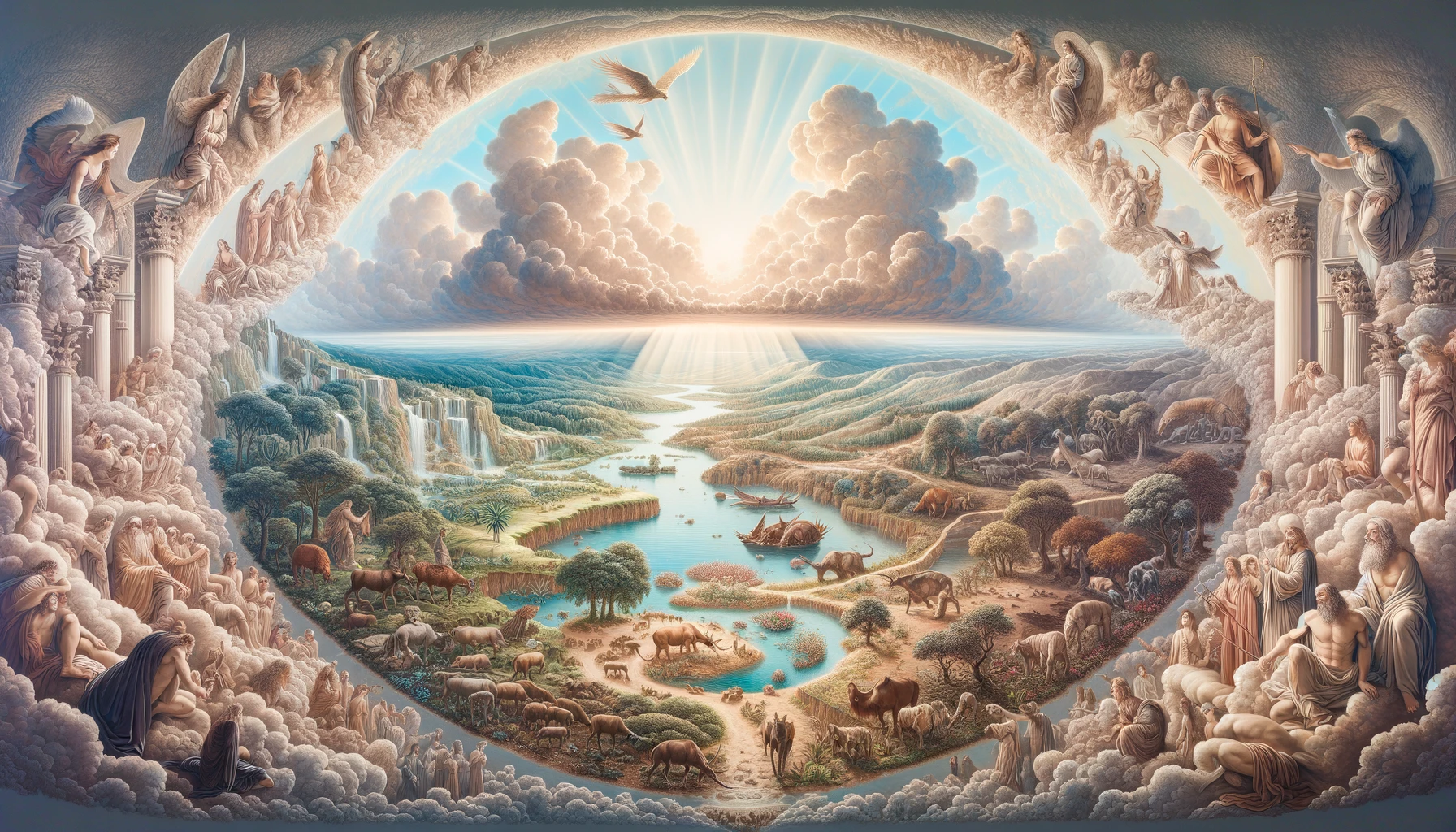Many approach Genesis as a straightforward literal and historical record of the Earth’s beginnings— a series of divine commands executed over six days. However, Genesis 1 is far more than meets the eye. The beginning of Genesis uses a structured, poetic form typical of ancient Hebrew literature, which serves a deeper purpose than simply marking time.
The meaning of Genesis is far deeper when we allow the writing to do what it was intended to do instead of trying to make it into a Western history book or a science book. It is a book written to remind an exiled people of who their God is and who they are. Let’s delve into the style, purpose, and context of Genesis, revealing its richer layers of meaning beyond a literal week of creation.
The Poetic Structure of Genesis 1
The narrative of Genesis is not merely an account of events but a crafted poem that uses repetitive phrases and rhythmic patterns to aid memorization and oral transmission. The phrases “And God said” and “And there was evening, and there was morning,” mark the days in a way that highlights a methodical approach to the storytelling.
This poetic structure does not aim to document a chronological sequence of literal days but rather to emphasize the thoughtful and purposeful nature of God’s creative acts. This approach contrasts sharply with the chaotic creation myths of neighboring cultures, where the cosmos often emerges from conflict or randomness.
The creation stories of other religions popular at the time the book was written show gods who are battling in a world of chaos, each trying to gain the upper hand. The gods of these creation stories are chaotic, random, and inconsistent in their dealings with humans. Genesis offers a contrast. A single God who is in complete control and who brings order out of chaos. You can count on the idea that just as sure as the sun rises and sets each day, this God is the same each day.
The poetic styling also allows the story of this One God to be memorized and told using the oral tradition. There were no printing presses at the time of the writing of Genesis and only the most scholarly could read.
Another reason for this poetic approach — far more important to the Hebrew people than a literal creation account — is to set up the importance of the Sabbath. It is the Law and the Sabbath that set God’s people apart. The Sabbath was one of the things that made the Hebrews a people and it was their central custom. Six days you shall work, one day you shall rest. God resting on the seventh day of the creation story shows the importance of God’s people resting one day a week. The historical or scientific accuracy of the things that came before the day of rest are not as important as the rest itself.
Theological Intent of Genesis
The primary aim of Genesis is theological, focusing on the nature of God as a deliberate and sovereign creator. This narrative introduces a world created with intention and order, reflecting the character of God as dependable and just.
The ordered presentation underscores God’s authority and contrasts with the unpredictable deities of the time. It sets a foundational understanding for humanity’s role within this orderly universe, tasked with stewardship and care—a reflection of God’s own guardianship over creation.
Written during the Babylonian Exile in the 6th century BCE, Genesis served as a theological anchor for the Israelites amid the prevailing Mesopotamian influences.
Surrounded by cultures with polytheistic and morally ambiguous creation stories, such as those found in the Enuma Elish, Genesis reinforced the Israelites’ monotheistic worldview. By depicting a single, all-powerful God who systematically and peacefully creates the world, Genesis helped preserve the distinct identity and beliefs of the Hebrew people during a time of cultural and spiritual vulnerability. The intent of Genesis is to show the identity of God and the identity of the people he called his own. It was cultural and personal to an exiled people longing for their homeland and their culture and identity, which was being drowned out by Babylon.
Do you see it? Genesis was written to a people who were exiled from Israel to Babylon who were longing to be back in the land of milk and honey. Does that sound familiar? Wouldn’t the story of a man and woman exiled from paradise be relatable to people who were kicked out of their own home? Or the story of a people who found their new homeland, but were driven out of it by famine and then rescued by a hero and brought back to that land again? Can you see it now? Can you see how the story of a God who stands by His people through flood, and fire, and sin, and famine and leads them back home every single time would help hold a nation in exile together? That is the Genesis you never knew, but the Genesis that was written for the Hebrew people during a time when they were most vulnerable and most afraid.
Why Genesis Matters Today
For modern readers, recognizing Genesis as a symbolic and theological text opens up new avenues for understanding. This perspective shifts the focus from the historical literalism that is important in Western thought to exploring themes of divine intentionality that were important themes in the Eastern thought that gave us the Old Testament.
While it was deeply personal and cultural to those in exile, readers today can focus certainly on their desire for the Kingdom of Heaven or on their own place in the universe, encouraging a life that aligns with the purposes and order established by an orderly, loving, just, and consistent God who has an orderly will and desire that aren’t subject to the whims of fate or the stars or earthly governments.
Understanding Genesis in this way enriches one’s engagement with the text, allowing for a deeper appreciation of its messages about order, purpose, and divine intention. It challenges us to consider our responsibilities to the world and each other, guided by the wisdom of a narrative that transcends time and continues to inspire.
Discover more from Jesus Quest
Subscribe to get the latest posts sent to your email.



